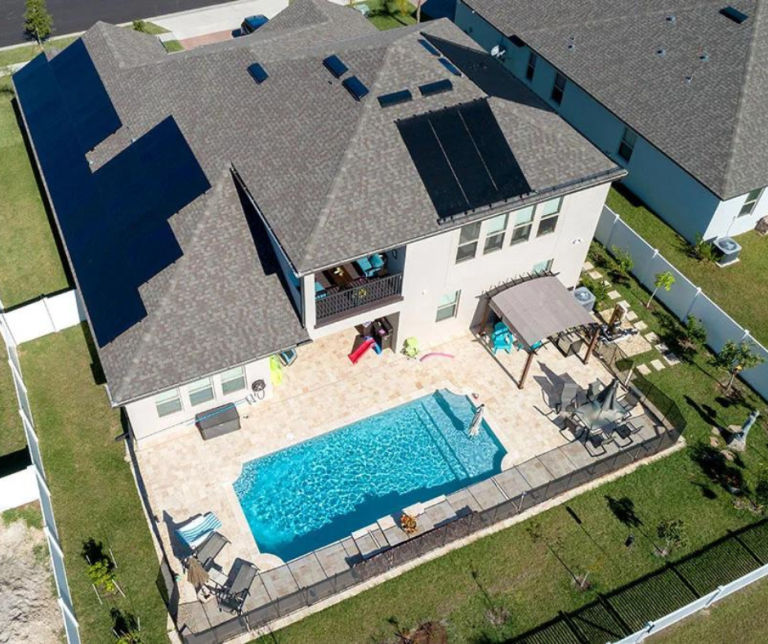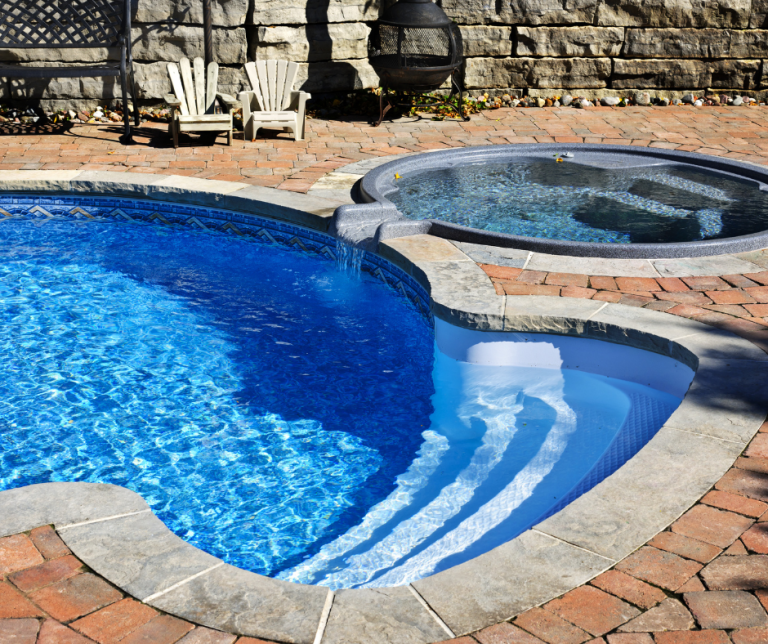Summer is the perfect time to enjoy your pool, but what if you want to swim beyond the hot summer months? A pool heating system is the solution. But how do you choose the right type of system from all your pool heating options, and how can you be sure it’s the best fit for your needs?
Gas, electric, and solar pool heating systems each have their own set of benefits and drawbacks. To make an informed decision, you need to know all the facts. Here’s an overview of the advantages and disadvantages of each type of pool heating system, including the pros and cons of solar heating.
Types of Pool Heating Options
Gas Pool Heaters
Gas pool heaters operate by burning fossil fuels such as propane or natural gas. The heater features a combustion chamber where the fuel is burned, generating heat that warms the pool water. This type of heater can heat your pool quickly and is suitable for year-round use.
However, gas pool heaters come with certain disadvantages. The fuel required adds to your utility bill, and the system is only efficient when used for short periods. Additionally, gas heaters produce emissions due to fuel combustion, making them less environmentally friendly. Therefore, gas heating systems are best for infrequent pool use. If you plan to extend your swim season, you might want to consider a more efficient option.
Current Costs of Gas Pool Heaters:
Initial Installation: $1,500 – $3,500
Operating Costs: $200 – $400 per month
Gas Pool Heating Pros and Cons
Pros:
Heats pool water quickly
Cons:
High operating costs for fuel
Inefficient for long-term use
Produces emissions
Electric Heat Pumps
Electric heat pumps are among the most common methods for heating pools. They work by transferring heat from the air to the pool water through a heat exchanger. Compared to gas heaters, they are less expensive to operate and can be used throughout the year.
While electric heat pumps don’t produce emissions like gas heaters, they are still not the most efficient option. With rising national electricity rates, you can expect higher monthly utility bills if you choose to extend your swim season. Moreover, colder weather requires more energy to heat the pool, increasing power consumption.
Current Costs of Electric Heat Pumps:
Initial Installation: $2,500 – $5,000
Operating Costs: $100 – $200 per month
Electric Pool Heating Pros and Cons
Pros:
Can be used all year round
Cons:
Higher monthly utility bills
Uses more energy depending on the weather

Solar Pool Heating
Solar pool heating systems utilize the sun’s radiant energy to warm your pool water. Since they harness free solar energy, these systems don’t have any additional operating costs. They are also reliable and durable, with solar panels lasting up to 15 years or more.
The process is simple: pool water is filtered to remove debris before it moves to the solar collectors on your roof. The water is heated as it circulates through the collectors and then returned to the pool. This cycle continues until the desired temperature is reached.
Current Costs of Solar Pool Heating:
Initial Installation: $4,000 – $10,000 (depending on unique factors)
Operating Costs: Negligible (uses existing pool pump)
Solar Pool Heating Pros and Cons
Pros:
Inexpensive to maintain
Long-lasting
Environmentally friendly
Cons:
Upfront costs of installation
How do You Determine the Right Pool Heating Option?
Selecting the right pool heater depends on several factors, including your location, pool usage frequency, and pool size. For the most energy-efficient and reliable heating solution, your specific needs will dictate the best system for you.
One effective way to retain pool heat is by using a pool cover. Around 75 percent of heat loss occurs due to evaporation. A solar cover acts as a barrier, helping to preserve your pool’s temperature. Regardless of the heating system you choose, a pool cover can help reduce heat loss through evaporation.
Where You Live
Your local climate plays a crucial role in determining the best pool heating system. In sunny and warm areas, such as California or Florida, a solar pool heater is the most energy-efficient option. In colder climates, heating your pool requires more energy, especially in cooler months. Gas heaters might be less economical in these regions for extending the swim season.
How Often You Use Your Pool
If you only use your pool a few times a year, the added utility costs of an electric or gas heater may not be significant. However, if you want to use your pool beyond the summer months, consider a cost-effective heater with low or no operating costs. Solar pool heaters, which use the existing pool pump and solar energy, might be your best option for extended use.
The Size of Your Pool
The size of your pool affects the amount of energy required to heat it. Smaller pools require less energy to reach the desired temperature, while larger pools need more time and power to heat. A gas heater may be too expensive for large pools, particularly in cooler climates. Consider this when evaluating which system will save or cost you the most in utilities.
The Right Pool Heating Option will Extend Your Swim Season
Your swim season doesn’t have to end with summer. A pool heating system can keep the fun going, allowing you to enjoy your pool whenever you like. The right system for you depends on your specific needs and how often you want to use your pool.
Among gas, electric, and solar pool heaters, solar heating is generally the best option for year-round swimming without additional operating costs. Dive into the world of pool heating and enjoy your pool all year long—the water’s fine!



